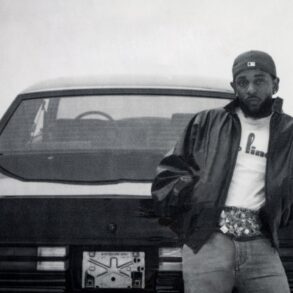Meet the Baltimore area’s leading voices in business, activism, research and more.
Look for the 25 Women to Watch in a special magazine supplement in some editions of The Baltimore Sun on Sunday, Oct. 15. The women will be honored with a celebration at the Baltimore Museum of Art on Oct. 11.

Chief of equity and fair practices, Enoch Pratt Free Library
M’Balu “Lu” Bangura, 33, never thought she would end up working for a library, but it has turned out to be the right fit. With a criminal justice degree, she started her career as a one-woman department investigating civil rights claims for the city of Tacoma, Washington, before taking a job as a civil rights investigator in Baltimore, leading her to become the city’s first equity specialist.
In 2021, she joined the Enoch Pratt Free Library and, as of June, serves as the chief of equity and fair practices for that institution and the Maryland State Library Resource Center. In that role, Bangura is organizing programs for women reentering the workforce following prison sentences, planning a grocery store-style market at the Highlandtown library branch offering free produce and lending out hundreds of laptops to bridge the city’s digital equity divide.
“Pratt is a resource well known and trusted for doing positive work. To help Baltimore City like I want to help Baltimore City, I can’t do it without that institution behind me,” Bangura said.”It is my strong belief that libraries are more than just books. Libraries have a duty to respond to the needs of the community. Libraries are supposed to be a resource and when you work in an inner city that has so many needs, it would be irresponsible for us to not be expanding and trying new things,” Bangura said.
— Dillon Mullan
Co-founder, Curio Wellness
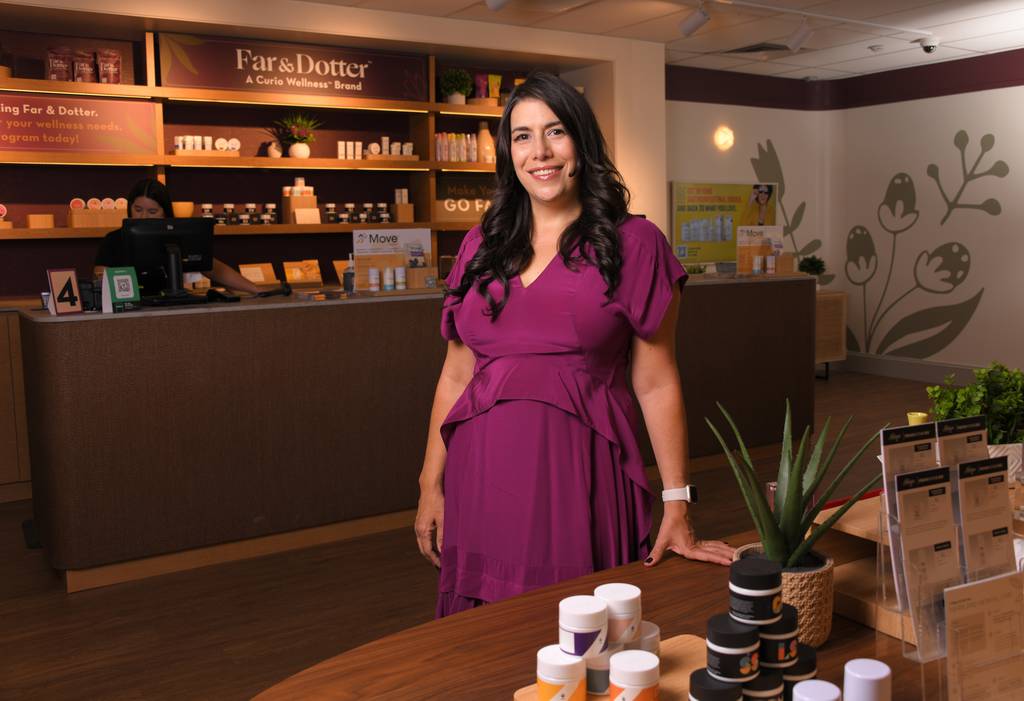



Fresh off graduation from business school and a vacation in Colorado, Wendy Bronfein and her father, Michael, noticed in 2014 that a new market was emerging in Maryland: medical marijuana. The two started Baltimore County-based Curio Wellness, which remains a family-run cannabis organization — its flagship dispensary in Timonium is named Far & Dotter, which is Swedish for “father and daughter.”
On July 1, recreational marijuana became legal for Marylanders 21 and over, which expanded the market beyond only customers with a medical license, more than doubling demand. Now that adults can legally walk into her stores, it’s nice to be “out of the shadows,” said Bronfein, 42, who is Curio’s chief brand officer and director of public policy.
As Curio has grown, Bronfein has prided herself on always having products available. She doesn’t want a customer to go looking for a Curio product they enjoyed and not be able to find it. The brand’s focus, Bronfein said, is “differentiated products and customer delight.”
Seven years ago, Curio Wellness started with a team of about 10. Now, it has 350 employees and has expanded into Missouri with plans for more growth.
“Ultimately, our goal is to see the laws in this country change such that capital markets open for cannabis businesses, and we would seek to go public on an American exchange at that time,” she said.
— Hayes Gardner
Head of broker/dealer distribution, U.S. Intermediaries division, T. Rowe Price
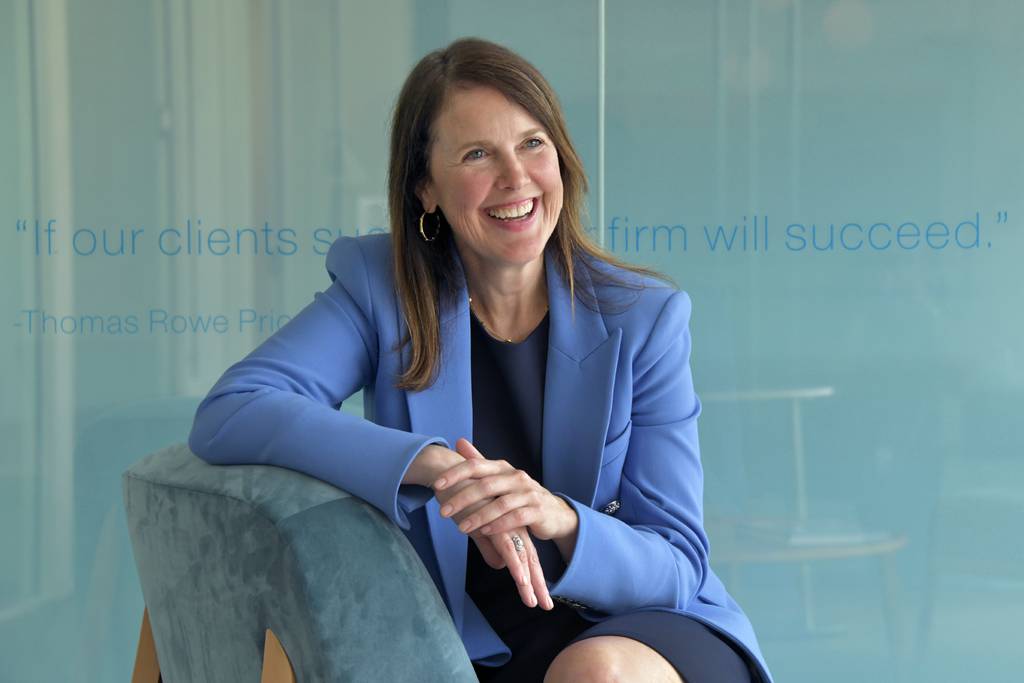



For Annie Whitescarver Brown, 51, who started in client services at T. Rowe Price just three days out of college in 1993, the path to a vice president role has been indirect.
In 2004, Brown left the Baltimore-based investment management firm to raise her young family, returning 10 years later to the industry, which requires staying on top of investment trends and regulatory changes.
Now, the Towson native heads one of the fastest-growing segments within the firm’s U.S. wealth area and has for the past five years. Her team offers a range of investment solutions and services to financial professionals at wealth management firms across the country. Bringing on new and diverse talent remains one of her top priorities.
Brown, who is the daughter of an investment adviser father and a stockbroker mother, says a positive focus helped her career.
“I lead with a focus on the mission at hand, a focus on our strengths and then encourage that we use our collective power to achieve and succeed as a team.”
— Lorraine Mirabella
CEO, Profiles Inc.
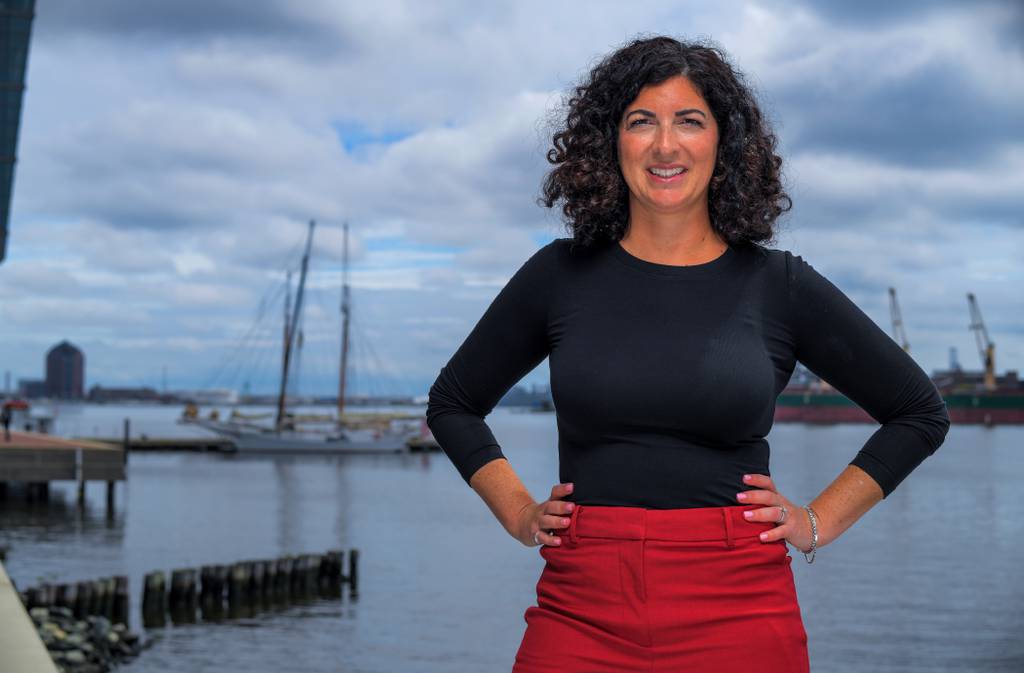



Amy Burke Friedman, 42, has spent the bulk of her career — 20 years — working for Profiles, a Baltimore-based marketing and communications firm, in various roles.
But each day is different from the next. She has done it all, from planning a Baltimore Symphony Orchestra gala, to organizing a media snorkeling event at the National Aquarium, to coordinating the grand opening of Ray Lewis’ Full Moon Barbecue, the former Ravens linebacker’s short-lived Canton restaurant.
As of Jan. 1, Burke Friedman added another role to her resume: CEO. Following the retirement of her mentor and Profiles’ founder, Amy Elias, she’s now in charge of the small but well-connected firm, which has nine employees and a roster of clients that includes big Baltimore names like Kennedy Krieger, T. Rowe Price, the Greater Baltimore Committee and Hotel Revival.
“We’ve grown in size, we’ve grown in clients, we’ve grown in capabilities,” Burke Friedman said.
A lifelong Baltimorean who grew up in Mount Washington and attended Western High School, Burke Friedman said she’s focused on telling local stories and building the city’s pride.
“There’s a legacy here that we have put a lot of work into and had a lot of fun with, and we definitely want to keep going,” she said.
— Amanda Yeager
Director of community and external affairs, Archdiocese of Baltimore; director of Seek the City to Come initiative
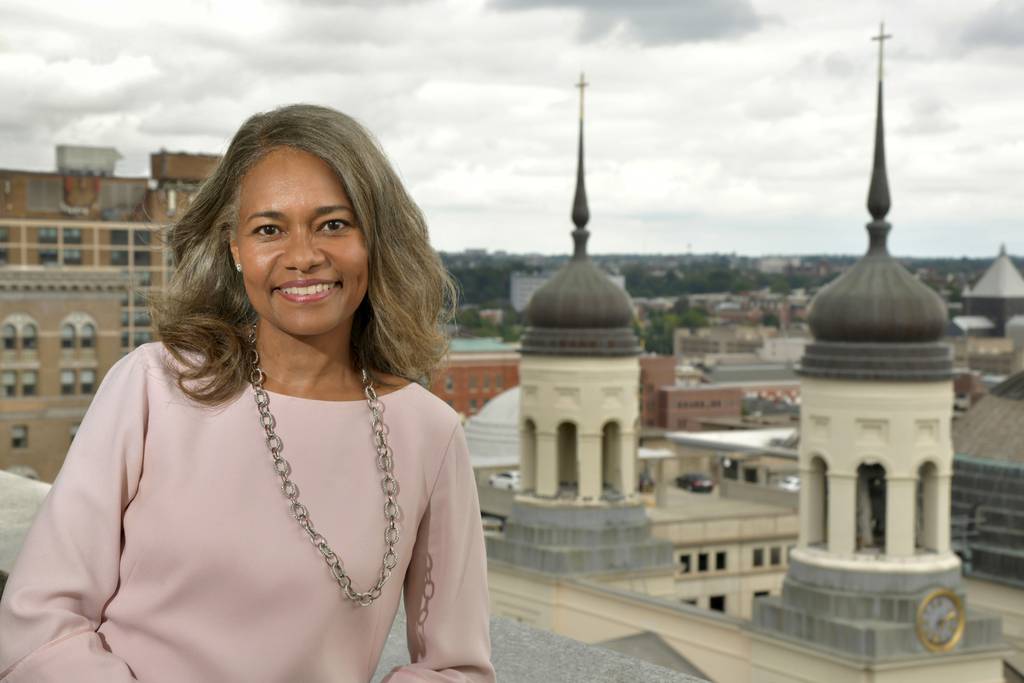



When the Archdiocese of Baltimore hired Geri Royale Byrd, 56, to direct Seek the City to Come, the multiyear initiative by which it hopes to revolutionize operations in the city, the West Baltimore native and lifelong Catholic said she felt her life coming full circle.
The award-winning strategic communications professional spent decades helping East Coast firms and public agencies realize their visions. Now she’s driving an unprecedented self-improvement campaign by the nation’s oldest archdiocese.
Byrd says her team will weigh all ideas as the Church reassesses how it does business in the city, and she’s making good on that vow. More than 75% of Baltimore’s Catholics have taken part in the town halls, surveys and parish meetings she has led. She’s about to launch a second, “visioning” phase, with the flock called on to brainstorm, turning the findings into reality.
“Seek the City to Come is ultimately about bringing everyone to the table with their multiple gifts, in one body, for the mission of Christ,” she said. “If we can lock arms together, we can unleash the power of God and brightly spread his light. I’m hope-filled for this initiative and for our city.”
— Jonathan M. Pitts
Founder and executive director, Baltimore Safe Haven
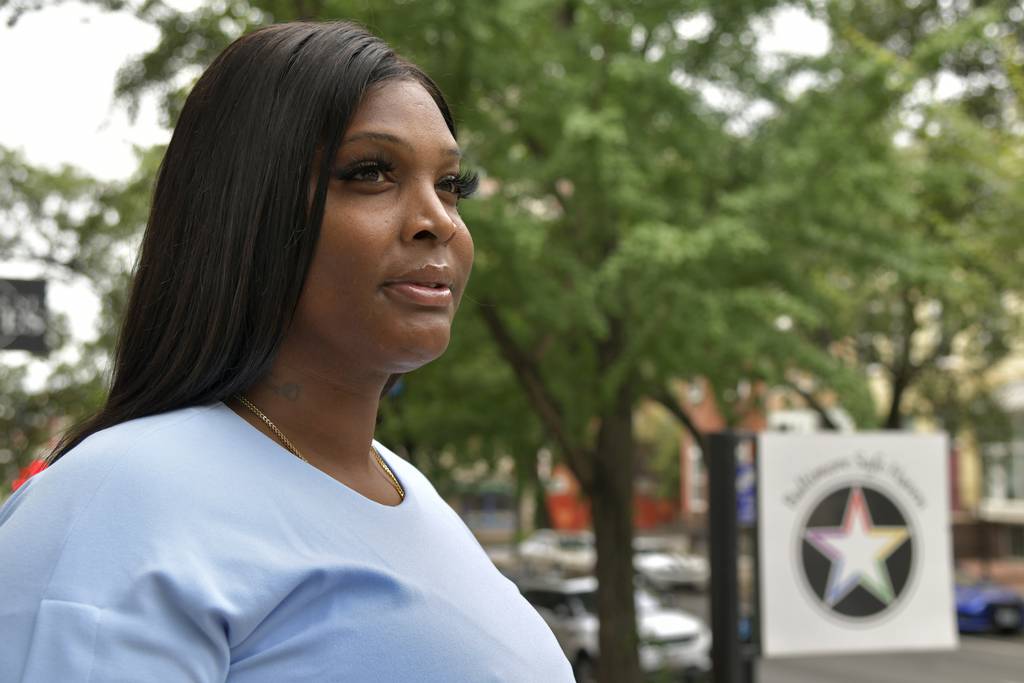



When Iya Dammons, 38, isn’t on the front lines advocating for people like herself, a Black trans woman, she’s running the transitional housing nonprofit she founded. She knows it’s a lot, but she also knows “someone has to do it.”
Members of the LGBTQ+ community are increasingly seeking sanctuary in Maryland, and Dammons has “no other choice” but to help house them, she said. She founded Baltimore Safe Haven in 2018 to do just that for queer people across the state. Safe Haven is “building people from the ground up, from survival, so that they can thrive,” Dammons said, by providing necessities like bus passes and clothes alongside access to workforce development and rent deposit checks.
In Baltimore, there’s a drop-in center and six Safe Haven-operated homes, which house 37 people and are at capacity. In July, Dammons opened a D.C. drop-in center. Looking to the future, Dammons — who said she is focused on having a “listening ear and not a running mouth” — uses Safe Haven to build new leaders in a process she calls “crowning queens.”
“Trans leadership might be in the back of the acronym. But we’re in the forefront of the work,” Dammons said.
— Maya Lora
Chief of the Forensic Science and Evidence Services Division, Baltimore Police Department
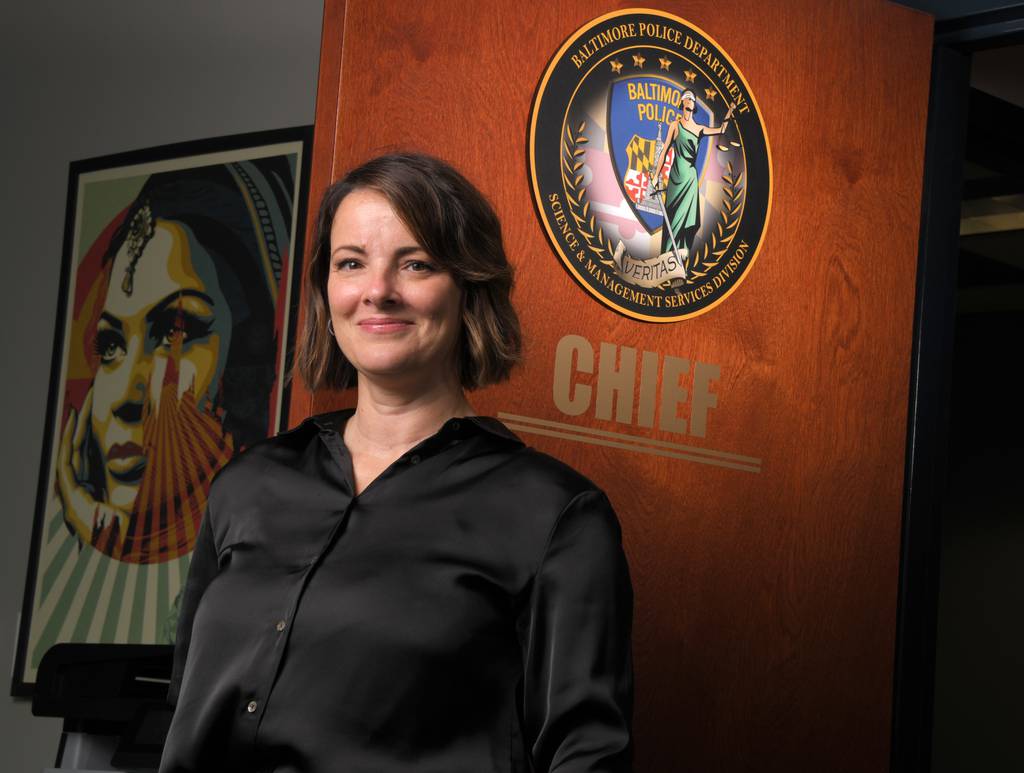



When Rana DellaRocco, 49, first applied for a position with the Baltimore Police Department’s crime lab, an interviewer asked whether she knew she’d be going out to crime scenes. “Did not know that’s what this was, but sounds awesome,” she replied. Over the next two decades, she rose from crime scene technician to become the agency’s first female lab director, and as of last year, its first female chief of the forensic science and evidence services division.
In that time, the landscape of forensic science has transformed through the growing popularity of the “CSI” television series, which DellaRocco called a “gateway” to the sciences, and the Baltimore Police Department has embarked on its own transformation. As chief, DellaRocco is facilitating the crime scene unit’s “renaissance” and finding a new space for the division’s work.
She is also working to integrate the division by building cooperation, and she is teaching, so she has a hand in shaping the next generation of forensic scientists. She’s still as enthusiastic about the discipline today as she was two decades ago.
“We’re here to just be like, look, this is what the evidence is. It makes a big difference,” she said.
— Darcy Costello
Dean and provost, U.S. Naval Academy
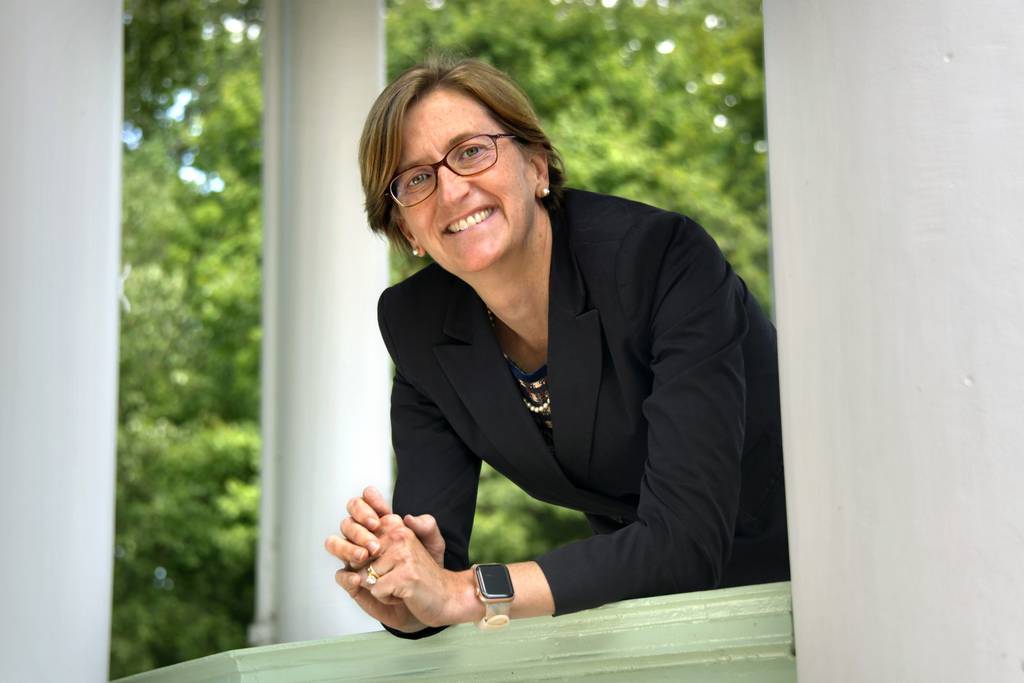



The U.S. Naval Academy named Samara L. Firebaugh, 49, as the new academic dean and provost in April. Firebaugh, who stepped into the role in July, oversees the academic programming for the approximately 4,400-member Brigade of Midshipmen and nearly 600 faculty members.
She came to the academy in 2001 to teach electrical engineering and has moved up the ranks, becoming chair of the Electrical and Computer Engineering Department and later the associate provost. Firebaugh says she sought a leadership role because she wanted to make an impact.
As provost, her goal is to be a relationship builder and to further the mission of the institution.
She is focused on “truly growing a community here.”
Outside the classroom and provost office, Firebaugh has received several academic and professional awards, including the 2022 Navy Superior Civilian Service Award.
— Caitlyn Freeman
President and founder, No Struggle No Success Inc.
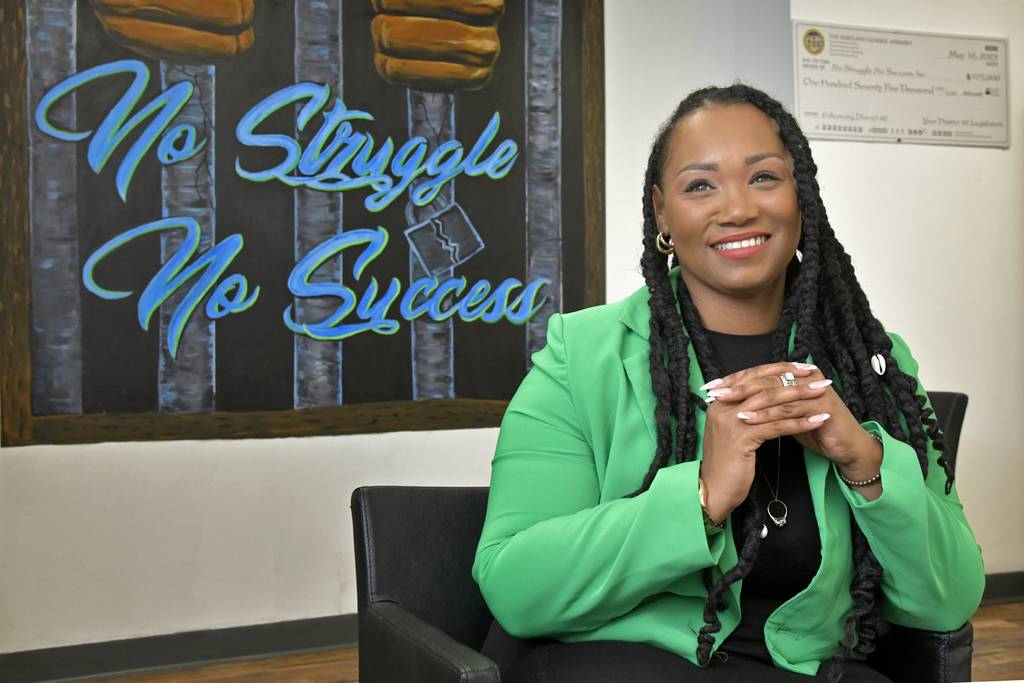



“My story is more relatable than most people realize,” said Janette Graham, 40, who started No Struggle No Success after one of her sons was sentenced to 25 years of prison time as a teenager.
Now, the Cuban American mother helps Marylanders with a multitude of services, be it helping prevent youth incarceration to aiding in people’s transition back to life outside prison. Since 2018, she said, she’s served more than 500 people and saved the state roughly $5 million. Graham said only seven people who have used her services have been rearrested.
“When people need help, if they know where the resources are and they know how to use those resources and know that someone is a phone call or drive or text away, it gives them way more strength and comfort to do what’s right,” she said.
— Sabrina LeBoeuf
Founder and CEO, WeSolar
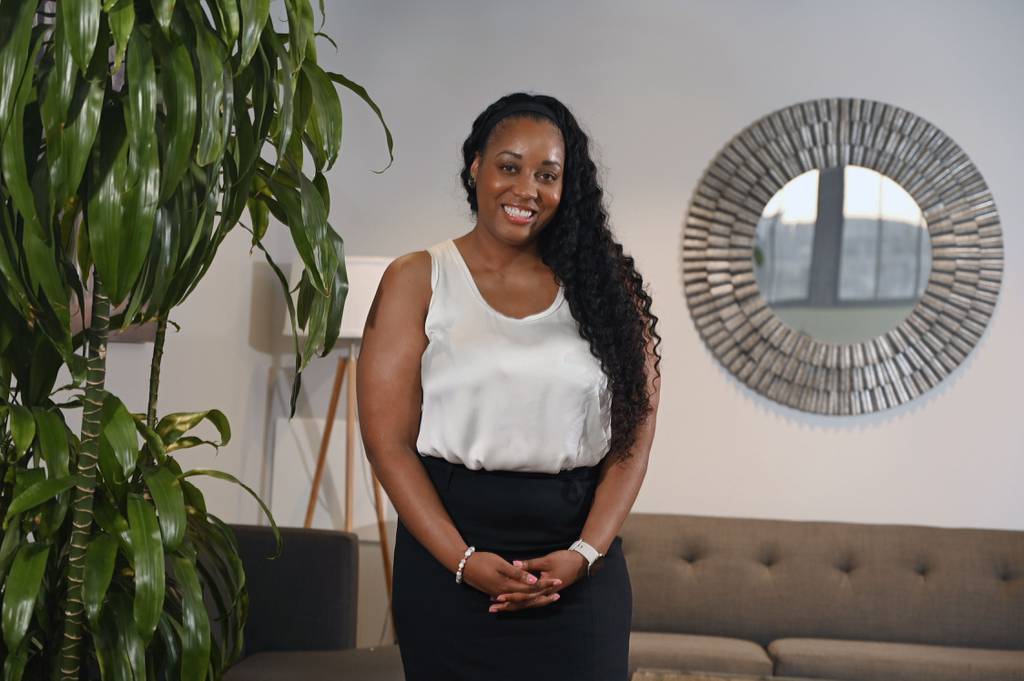



It was still early in the COVID-19 pandemic when Kristal Hansley was furloughed from her job as an adviser to the CEO of a Maryland-based solar company, but she turned the challenge into an opportunity. In June 2020, Hansley, 34, founded her own firm, WeSolar, working with commercial developers and local governments to install solar panels. She said she’s proud to be a Black woman CEO in an industry largely dominated by white men.
“Not only are we helping create a residual [income] to those existing businesses, empowering them and building economic resilience, but also we’re decarbonizing our footprint in the cities and also saving vulnerable communities money on the BGE bill,” she said.
Hansley grew up in New York City. She studied political science at Howard University in Washington, D.C., and worked on Capitol Hill in community affairs and diversity initiatives. Today she lives and works in Baltimore.
“I love Baltimore,” Hansley said. “I think it’s an environment that really fosters creative ideas.”
When she’s not working, Hansley likes to read and take care of her two dogs, a bichon and a poodle.
— Giacomo Bologna
Havre de Grace City Council member, Harford County NAACP president
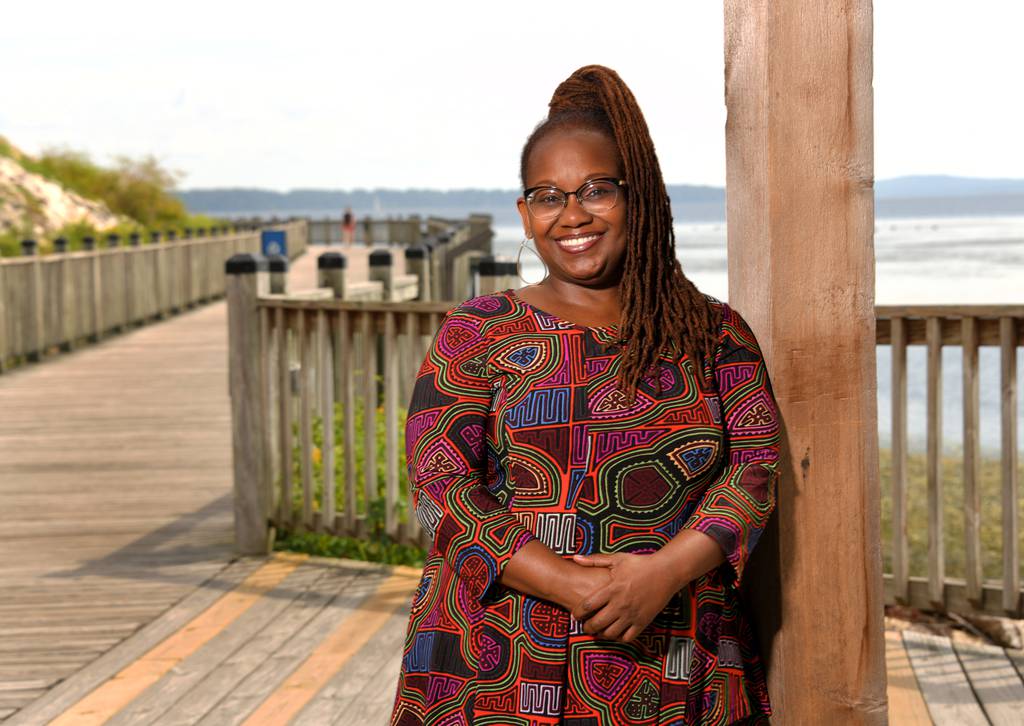



Before Vicki Jones takes on a new responsibility, she checks the three calendars that help her keep up with her obligations as the president of the Harford County NAACP, director of Harford County Public Schools’ Talent Pathways Project, and a member of various county boards, including the police accountability board and the social services department advisory board.
“I’m most interested in making sure that Harford County is a great place for all,” Jones said, “and so I think I have to be involved in making sure that that’s a possibility. … It’s my duty to encourage others to do the same.” Jones, 52, said the key to balancing it all is to stay organized and to have a good team to support you.
This year, Jones achieved one of her biggest accomplishments yet — being elected to the Havre de Grace City Council. “I still can’t believe that I did it,” she said. While she’s had a longtime interest in running for office, she did not often feel encouraged to be a part of the political process.
“That’s what makes it … a big deal for me,” Jones said, “because I figured it out.”
— Jason Fontelieu
Associate director, Kahlert Institute for Addiction Medicine; co-director, Research Initiative on Infectious Diseases and Substance Use. Both roles are based at the University of Maryland School of Medicine.




Sarah Kattakuzhy, 41, has had many mentors throughout her career, from her former boss at the National Institutes of Health to her current colleagues at the University of Maryland School of Medicine. But she said her biggest sources of inspiration are her patients, who are being treated for substance use disorder.
She’s in awe of the obstacles they’ve overcome and the constant work they do for their recovery. “Any good idea I’ve ever had has come from a patient,” she said.
This year, she’s proud to have helped drive the launch of the Kahlert Institute for Addiction Medicine, which aims to use cutting-edge research and clinical care to combat addiction to opioids, alcohol and other substances. “It’s been incredibly meaningful to participate in an effort that feels like it’s meeting the gravity of the country’s addiction crisis,” Kattakuzhy said.
“Change is really hard, and we have to change the way that we approach addiction,” she added. “We have to keep beating that drum, provider by provider, helping people reduce their stigmatization, but we also need to make big moves, because this is such a huge challenge. It’s a literal life-or-death situation.”
— Angela Roberts
Baltimore City administrator
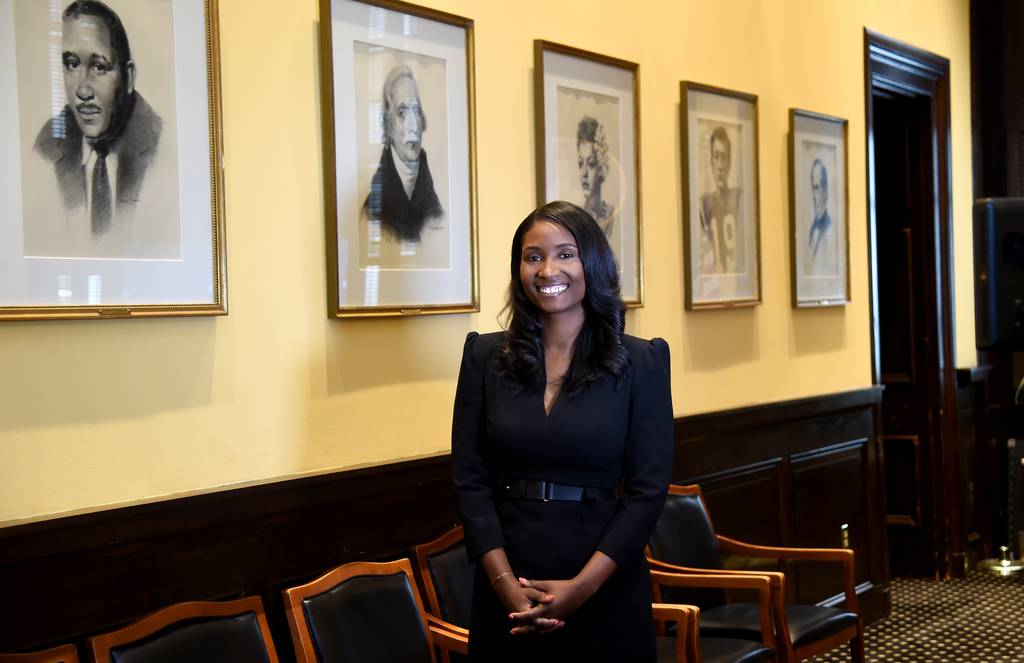



“I didn’t know I would fall for Baltimore so hard and so fast, but here I am,” Baltimore City Administrator Faith Leach told the City Council at her confirmation hearing in March. Since her arrival in 2021 by way of the private sector, Leach has been one of the most visible members of Mayor Brandon Scott’s administration and led some of his highest-priority initiatives.
In the aftermath of a deadly shooting downtown involving a confrontation between a driver and squeegee workers cleaning windshields for cash, Leach spearheaded the city’s Squeegee Collaborative, which brought together city leaders to steer youths toward alternative employment.
Now in Baltimore’s fledgling city administrator role, Leach, 40, is expanding her efforts to take on some of the city’s most persistent bureaucratic challenges, including water billing, a notoriously slow procurement system and recycling collection. It’s an unenviable task at times, but as Leach told the City Council, public service is a calling.
“We get to be messengers of hope for our communities. We get to be purveyors of justice and agents of change,” she said. “We get to use our lives, we get to use our very existence, to make the lives of others better.”
— Emily Opilo
Maryland secretary of state
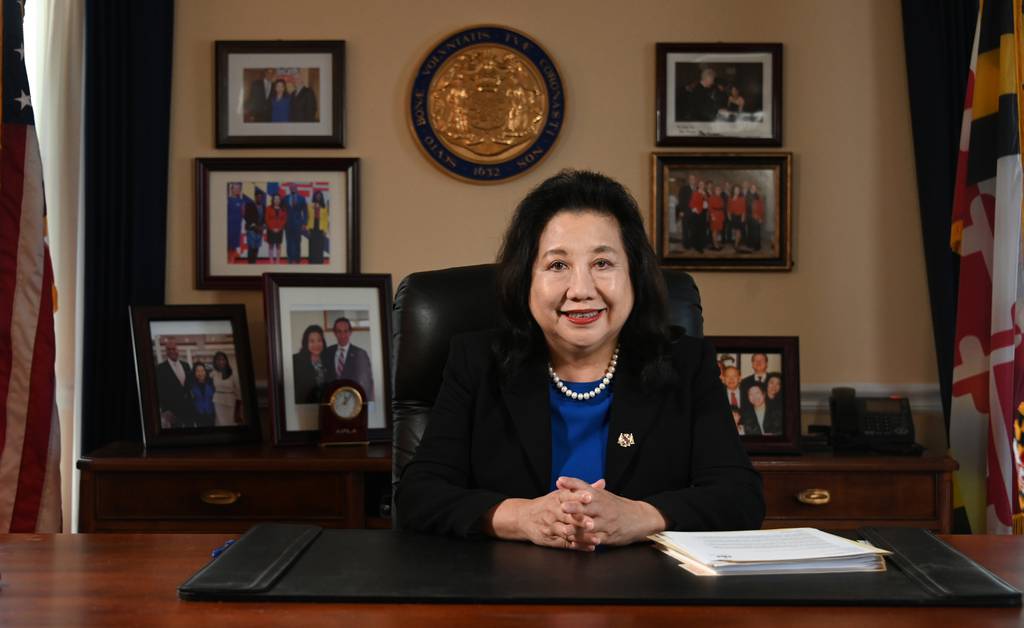



Secretary of State Susan Lee, 69, has found greater opportunity to “make this a better world.”
Before her appointment to the position earlier this year, Lee, a Democrat, represented Montgomery County in the Maryland state Senate for eight years and the House of Delegates for 13. During her time as a lawmaker, Lee sponsored legislation that led to the statewide ban on ghost guns and pushed for changes in family and domestic violence law, and cybercrime, among myriad other policy areas.
She was the first Asian American woman elected to serve in Maryland’s House of Delegates, the first Asian American elected to the Senate and the first to serve as secretary of state.
“I was really very honored to serve in the Senate and in the House … for about 21 years,” Lee said. “I have always felt that when I see an injustice I want to do something about it. I don’t want to be just a passive spectator,” Lee said.
Lee said she was honored that Gov. Wes Moore gave her the opportunity to serve as an ambassador for Maryland and lay the groundwork for the state to lead in industries, like life science and cybersecurity — “things that Maryland is number one in.”
— Hannah Gaskill
President and CEO, Under Armour
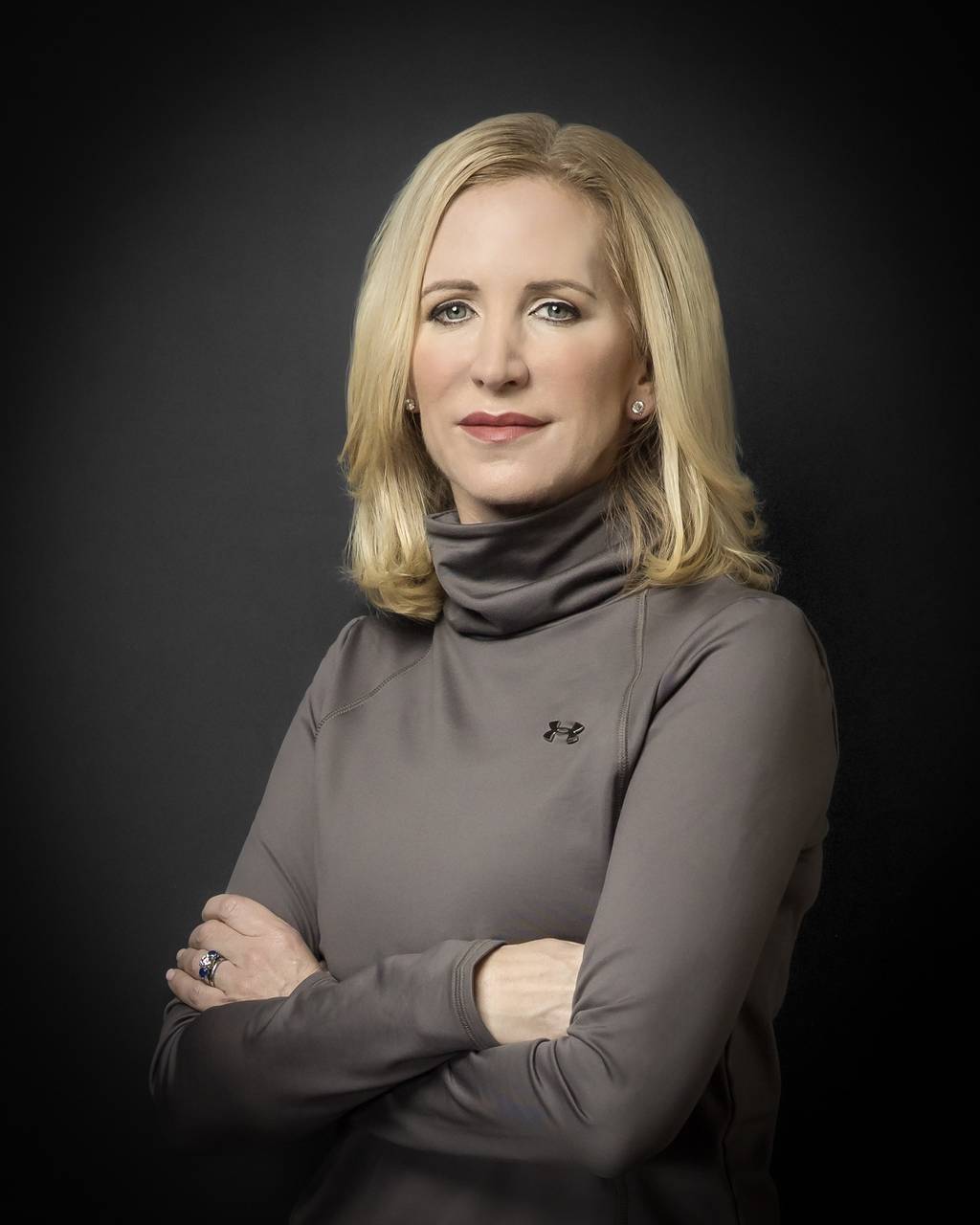



Soon after she became the first woman to run a major sports apparel and footwear brand in February, Stephanie Linnartz, 55, hit the ground running. Not surprising, given she is an avid runner and boasts two decades of corporate leadership experience.
At Under Armour, the former Marriott International president unveiled a growth strategy and helped launch a U.S. consumer loyalty program, revive the Protect this House marketing campaign, renew a sponsorship deal with Notre Dame and collaborate with NBA superstar Steph Curry on new basketball shoes. She’s eyeing ways to connect youth and women to the brand in a more meaningful way.
Linnartz, who grew up the oldest of six in a family in the hotel and restaurant business in Washington, D.C., first worked jobs cleaning rooms and checking in guests before becoming known for building Marriott’s Bonvoy loyalty program. Her mother was her earliest mentor.
“She taught me the importance of empathy and humility,” said Linnartz, a McLean, Virginia, native who has taken “this people-first approach centered on humility from my mother and family business with me in my leadership roles.”
“I always encourage women to ‘bet on yourself.’ It’s important to be your own agent of change by taking risks and advocating for yourself.”
— Lorraine Mirabella
Maryland lieutenant governor
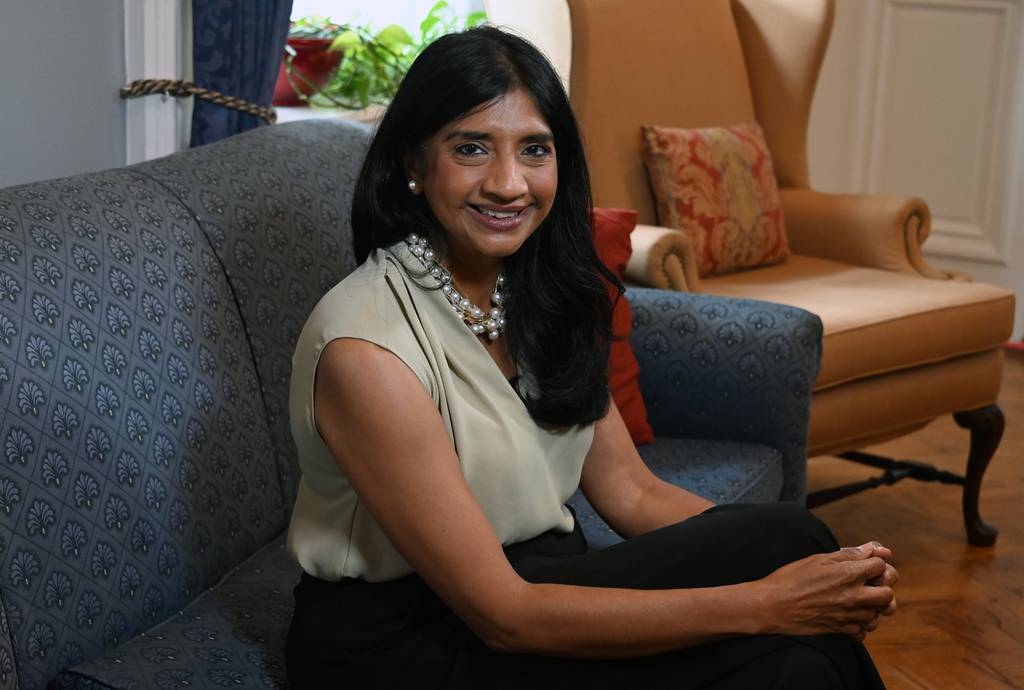



The back wall of Lt. Gov. Aruna Miller’s office in Annapolis — which she fondly calls “the people’s office” — is nearly bare. She wants to fill it top to bottom with pictures of constituents.
“I have to say the best part of this job is the people you meet — they change you, they make you grow,” Miller, 58, said. “I think the hardest part has been … when you are face-to-face with residents of Maryland and they’re sharing their life story with you and the ways that government wasn’t able to help them when they should have. It breaks your heart.”
An immigrant from India, engineer and former Montgomery County representative in the Maryland House of Delegates, Miller made history in January when she was sworn in as the first woman of color to serve as lieutenant governor. But, for Miller, being the first “wasn’t the assignment,” which was to breakdown barriers.
“I know each of us have walked into rooms and [was] like, ‘Wow, maybe I don’t belong here,’ and you see that as a sign because you don’t [see] somebody that looks like you in the room,” Miller said. “I say to every single person that’s in those moments: Don’t see it as a sign that you don’t belong there, see … that you’re meant to be there, that you have to be there, that you have to step up to the plate and do what’s needed so you can make it easier for other people to come into that space again.”
— Hannah Gaskill
Regional affinity manager for Greater Baltimore, M&T Bank
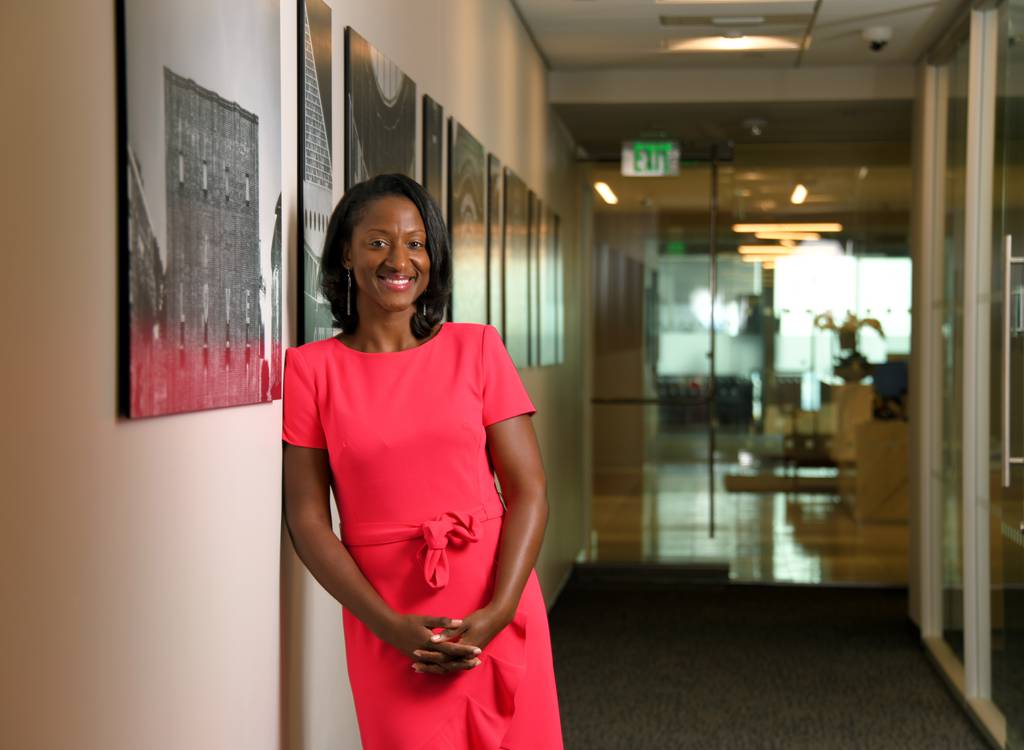



Detra Miller loves that every day at M&T Bank can bring a different challenge and opportunity. For the past few years, Miller has been overseeing programs aimed at supporting small businesses and particularly businesses led by people of color.
“Your life can be changed in an instant depending on your financial status,” Miller said. “How can we bring more empathy to banking? … I’m really proud of the fact of trying something different.”
Miller, 39, was born in Baltimore, but has lived throughout Maryland and spent part of her childhood in the Bahamas. After graduating from Towson University, she worked at Morgan Stanley for two years before joining a management development program at Provident Bank in 2008, which was a scary time in the financial industry, Miller recalled. Several months later, M&T Bank took over Provident and Miller has been with M&T ever since.
Today, Miller lives in Rosedale with her husband, a Baltimore City firefighter, and their two children. She loves being outside and said she’s trying to spend more time with people who bring her joy.
— Giacomo Bologna
Director, Baltimore Museum of Art




In the eight months since Asma Naeem was appointed director of the Baltimore Museum of Art, she hasn’t merely thrown open the front doors to artists from underrepresented backgrounds; she’s jimmied off the locks and jammed the doors open. She wants them to never close again.
“We’re beginning to unravel a lot of the assumptions around what art should look like and what qualifies as fine art,” said Naeem, 54, the Pakistan-born former New York City prosecutor and the first director of color in the BMA’s history. “We’re underscoring our commitment to artists who haven’t received the critical and scholarly attention they deserve.”
Naeem’s first exhibit as director traced the effects of hip-hop on the visual arts. “The Culture: Hip-Hop and Contemporary Art in the 21st Century” attracted national attention and received rave reviews. Best of all, it was her idea.
Last month, the BMA became the first museum in the world to highlight the full spectrum of female artists from the Middle Ages in its blockbuster show, “Making Her Mark.”
And stay tuned: Another groundbreaking exhibit is planned for next summer, though details have not yet been announced.
“New voices are beginning to take over,” Naeem said, “and they are conveying the majesty and depth of their artistic experience.”
— Mary Carole McCauley
Superintendent, Baltimore County Public Schools
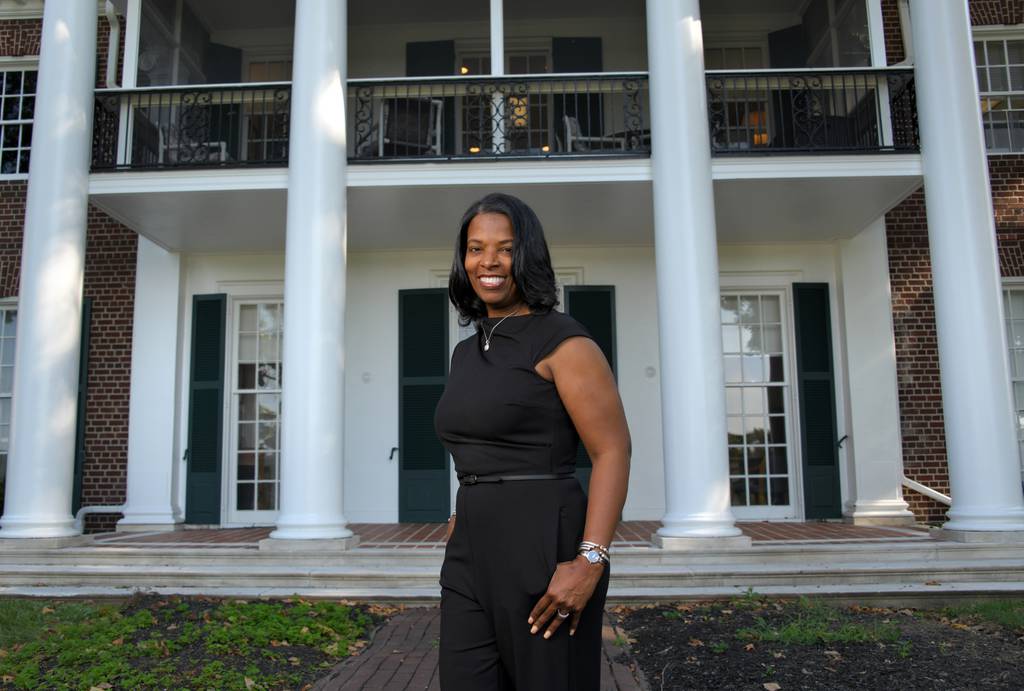



Myriam Rogers recently took the helm of Baltimore County Public Schools, but she is no stranger to the county’s classrooms. Rogers got her start in education as a Woodlawn High School chemistry teacher 27 years ago.
The former deputy superintendent says that homegrown teaching experience shapes her approach to leading the system, where she will prioritize student achievement, infrastructure, safety, and recruiting and retaining teachers.
“Where I learned about high expectations for students, regardless of any other factor, where I learned to love students and teaching, that foundation came from here,” she said.
After launching her teaching career in Baltimore County, Rogers spent two decades with Montgomery County Public Schools. She returned to Baltimore County about four years ago and began her new role in July.
Rogers said she has sought to create an open atmosphere where students, parents and staff feel empowered to contribute solutions.
“If you’re really engaging with people on a regular basis, then you really have the pulse of what’s happening in schools and offices and communities,” she said “What I’m most proud of is this feeling of hope and the efforts that we’ve made to engage with the community.”
— Cassidy Jensen
Assistant general manager of baseball operations, Baltimore Orioles
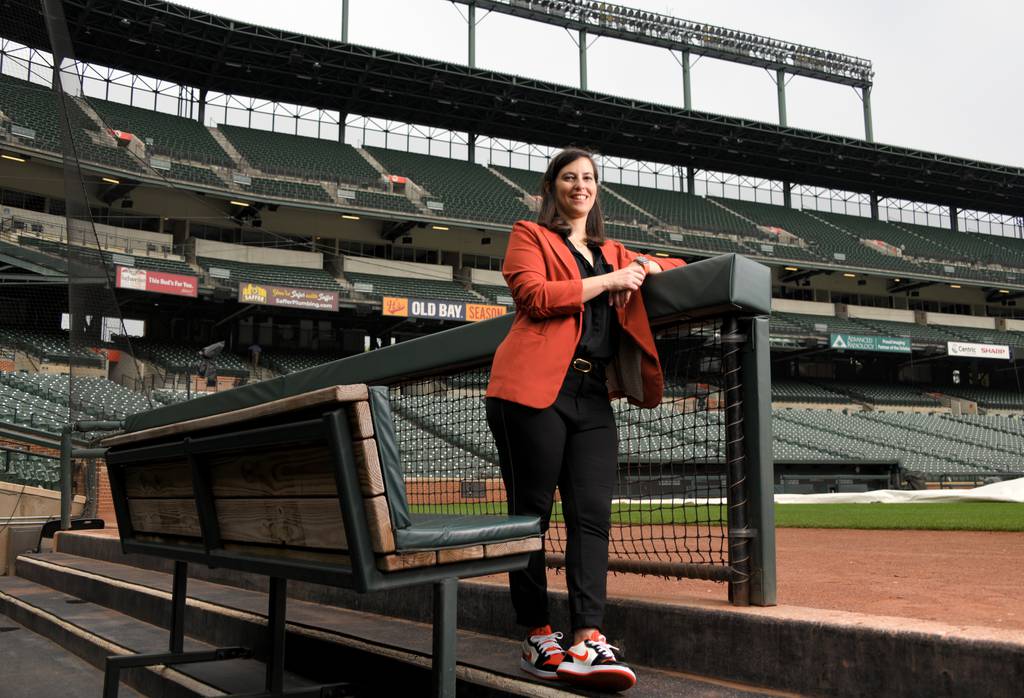



Each morning, Eve Rosenbaum’s first thought is about fueling up for the day ahead with cold-brew coffee. As the assistant general manager of baseball operations for the Orioles, a role she stepped into last year after serving as the team’s director of baseball development since 2019, Rosenbaum is “always on,” she said.
“The job is all-consuming,” the Baltimore City resident and Harvard University alumna added. “Everywhere I go … someone wants to stop and talk to me.”
Rosenbaum, 33, coordinates with the team’s coaches to manage and fine-tune the roster based on players’ performances. She also acts as a liaison for a number of other departments supporting the Orioles.
“Who knows what the future holds; that’s why we play the games,” she said. Baseball, she added, was her “first love.” Her parents brought her to Orioles games when she was less than a year old, and she played on a boys baseball team until high school, when she switched to softball.
In addition to her work in Baltimore, Rosenbaum is playing a role in the creation of a new Orioles academy in the Dominican Republic.
— Abigail Gruskin
Chief operating officer, Greater Baltimore Committee
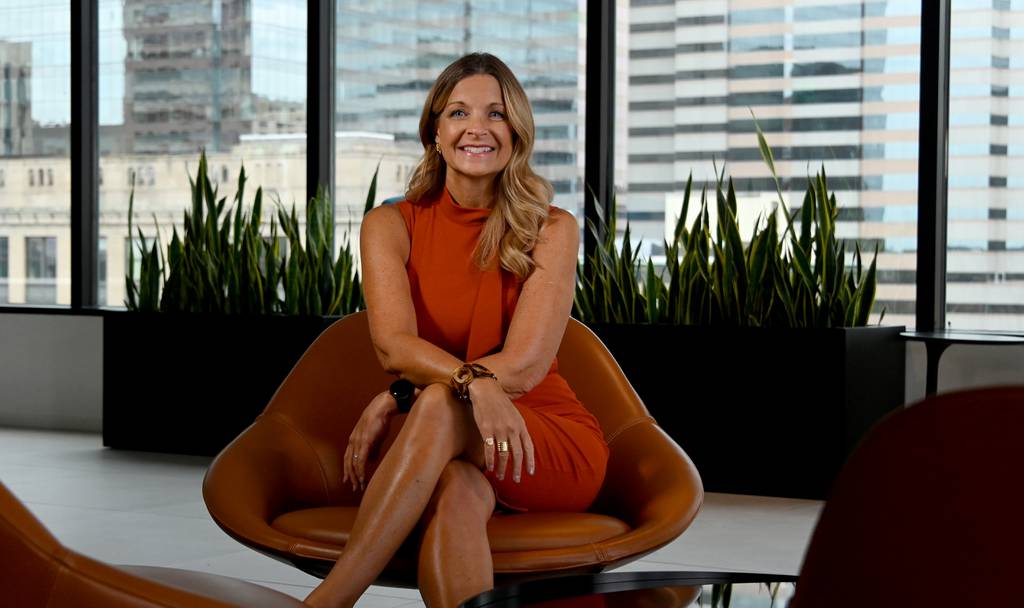



“A bridge wasn’t built to carry all the cars it’s ever going to carry at one time,” Sharon Markley Schreiber, 53, often tells her team. “So you carry the car that’s going over the bridge in the best way possible.”
That’s Schreiber’s philosophy as an operations person. It’s easy to get overwhelmed, especially during a frenzied merger like the one she led last spring between the Greater Baltimore Committee and the Economic Alliance of Greater Baltimore. Schreiber, the alliance’s former chief operating officer, stays clear-eyed about the bigger picture.
The Greater Baltimore Committee relaunched this year with Schreiber, who had been serving as interim COO, as the permanent chief operations officer. Her team’s work centers on improving the business environment, economy and quality of life for residents in Baltimore and seven surrounding counties.
A former interior designer and graduate of the Maryland Institute College of Art, Schreiber prides herself on finding creative solutions for complex problems.
“How do we move our citizens and tourists, people that we want to come to Baltimore, in and out of the city and just not through the city?” she asked. “We don’t want people to get off I-95 and zoom past the city without engaging with it.”
— Lilly Price
Chief operating officer, Johns Hopkins Hospital
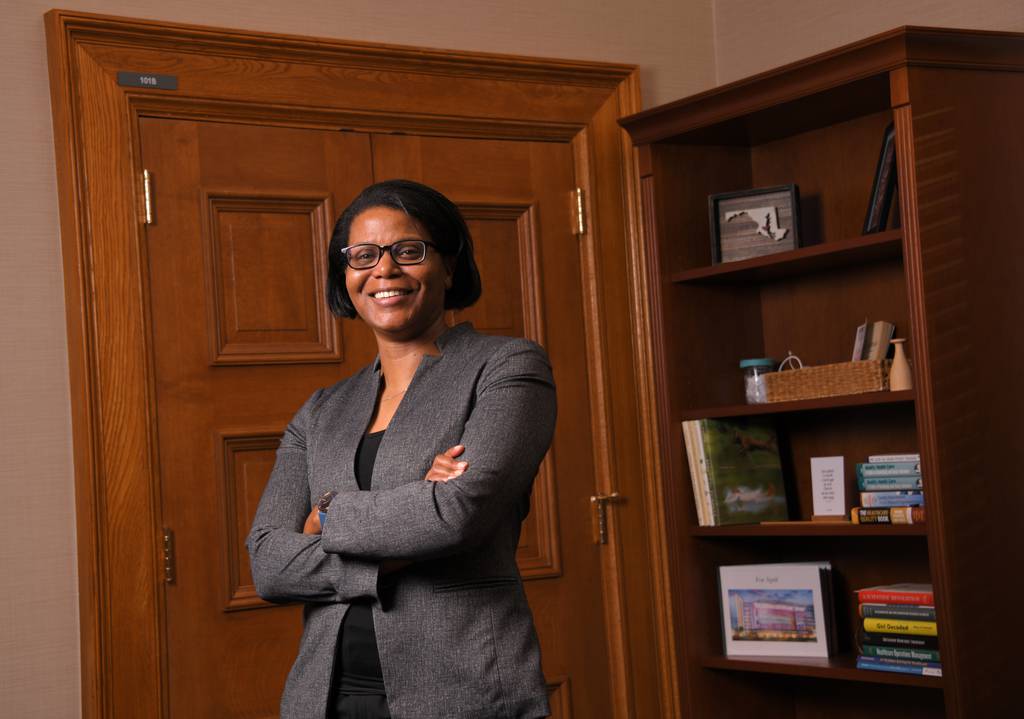



April Taylor is a proud Charles County native. So, when she was offered a job as vice president of quality at Johns Hopkins Hospital after more than a decade at the Children’s Hospital of Philadelphia, she jumped at the chance to return to her home state.
Since arriving at Hopkins in 2020, Taylor, 43, has endeavored to create a workplace culture where employees can thrive — a mission she’s continued since being appointed as the hospital’s chief operating officer in June.
“We have a long history of being an employer of choice in the community,” she said, but “with the pandemic, things changed. And so we knew that we needed to work even harder to make sure that folks continue to choose us, when they do have other options, even outside of health care.”
Maryland is a special place, Taylor said. Coming back home — and getting the opportunity to improve the health and well-being of people in East Baltimore and across the state — has been the highlight of her career.
— Angela Roberts
President and CEO, Associated Black Charities
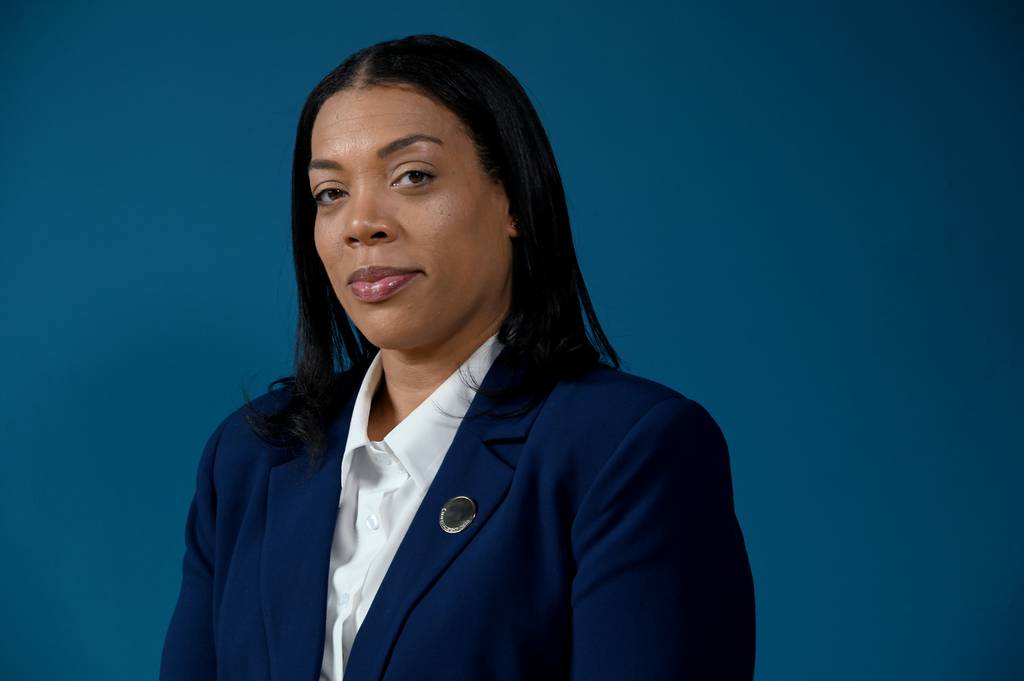



Chrissy Thornton grew up watching her mother break barriers as the first Black woman to work in security at the United Nations. Later, Thornton would help eliminate barriers for other women through entrepreneurship, financial literacy, and economic education and development.
“My very first and continued source of inspiration was my mother. She has always been the measurement of success for me and a strong example of the kind of person I want to be,” Thornton said.
As the president and CEO of Associated Black Charities, Thornton, 47, has supported nonprofits through rebuilding, the onboarding of board and committee members, fundraising plan creation and marketing. She has written six books that provide economic education for individuals and nonprofits.
Thornton also founded My Girl Power Hour, a discussion and event series empowering women to overcome obstacles, creating a safe space for a sisterhood.
“I would tell other young women who look up to me that the pathway to success isn’t straight and narrow,” Thornton said. “Instead, it is filled with curves and bumps and detours, that you have to be both ready and flexible enough to navigate.”
— Tony Roberts
President, Howard Community College
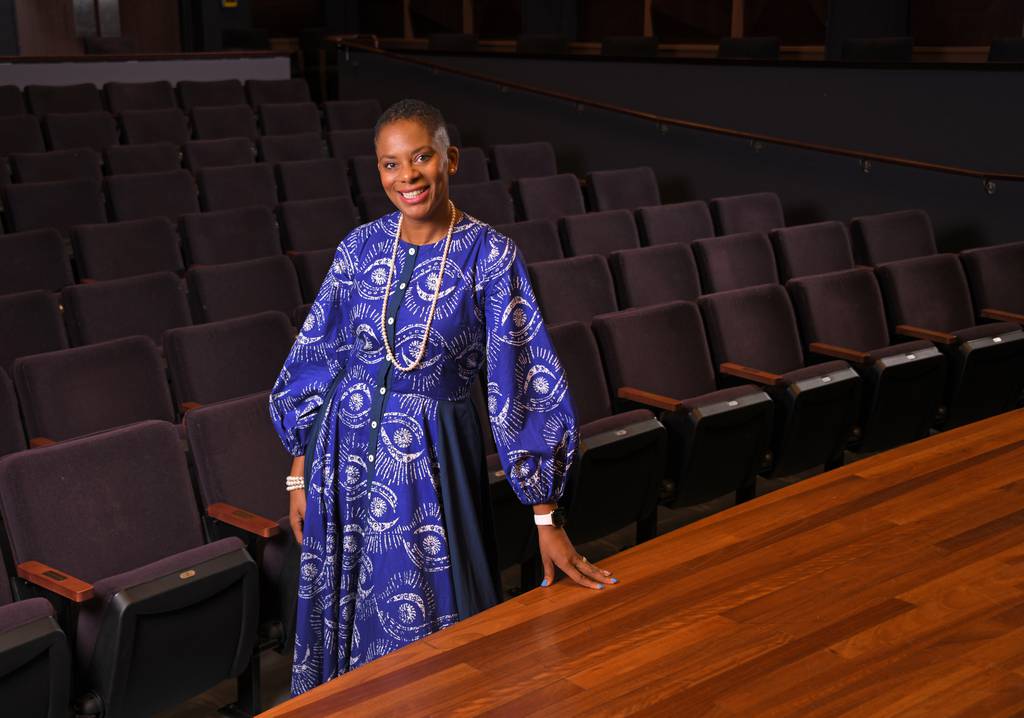



When Daria Willis became president of Howard Community College in January of last year, she made history as the first African American to lead the college, which was founded in 1966.
Willis, 39, began her career as an adjunct faculty member teaching history at Tallahassee Community College in Florida. She earned a bachelor’s degree in history education and a master’s degree in history from Florida A&M University, as well as a Ph.D. in history from Florida State University.
“I got all three of my degrees in history or some form of history education, and I can’t think of a better degree or track of study that would prepare someone for this role,” she said. “You have to understand context and space and time, and how people have reacted to change and pressures and different variances in their environment to understand how they will react to certain situations, which is the life of a college president.”
Among her goals as president include building a skilled trades education center and increasing the number of full-time enrollments.
“The biggest reward that we can have as an institution is to make sure that we are truly meeting our students where they dream,” she said. “We’re realizing that [by] making sure that they’re completing on time, they’re successful in their courses, we’re retaining them from semester to semester and we’re providing all of the holistic and wellness support services they need to be successful.”
— Allana Haynes
Vice president of global cyber operations and support, ZeroFox
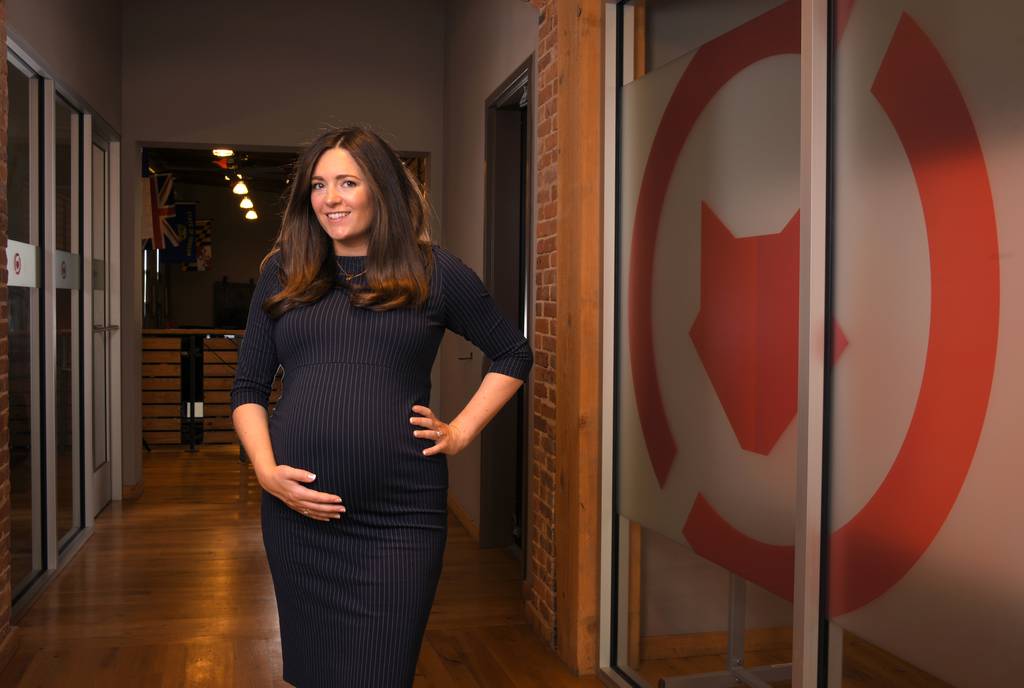



For Caitlin Wood Huber, vice president of global cyber operations and support at Baltimore-based ZeroFox, a career in cybersecurity wasn’t always in the cards. In college, she studied communication and graphic design, rather than computer science or engineering. But she considers her liberal arts background an asset, as she works with customers such as Nokia and the FBI to diagnose their cyber needs.
“That communication background really helps in making sure that we’re getting out the right information to our customers and that they can look to us as a leader,” Huber, 34, said.
Founded in 2013, ZeroFox has grown from a few employees based on Light Street to a public company with 900 employees, now based out of a former Pabst Brewing bottling facility in South Baltimore.
In her role, Huber supervises five teams of employees. Combined, they have taken down nearly 700,000 pieces of inappropriate content on social media over the past year using the ZeroFox platform, she said, including phishing scams and other potentially malicious posts.
— Christine Condon
Founder, Hampstead’s Little Free Pantry
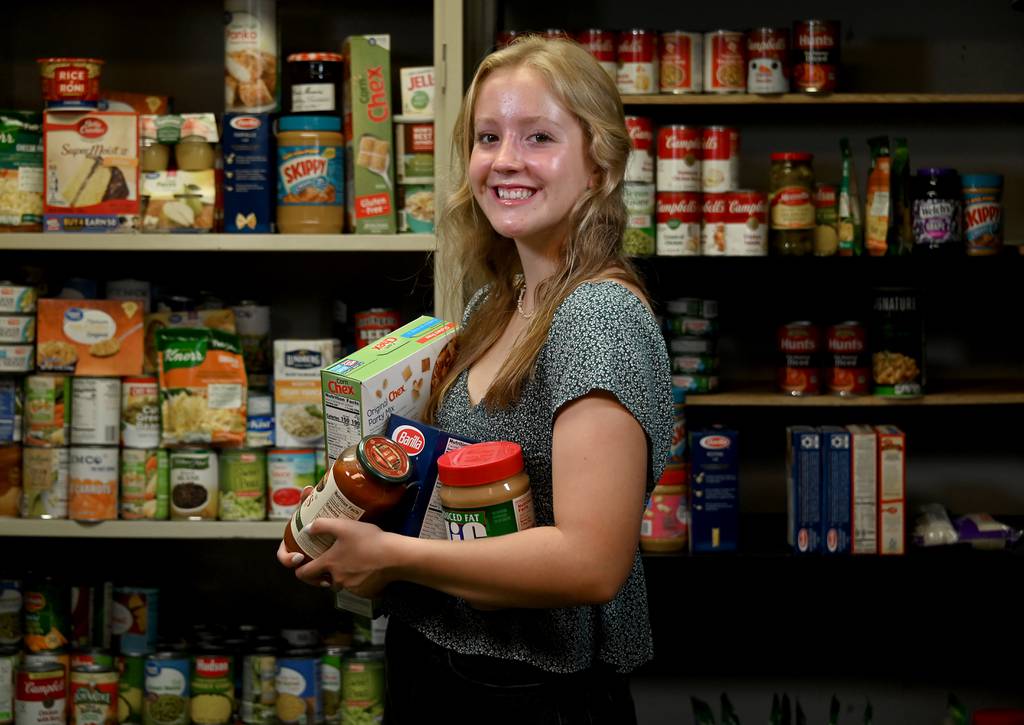



Makenzie Greenwood was only 9 when she founded Hampstead’s Little Free Pantry — a donation-based pantry that’s open 24/7 in the annex of St. John’s United Methodist Church at 1205 N. Main St., so those in need can access food at any time.
“I just had a genuine want to help the community,” said Greenwood, now 16 and a junior at Manchester Valley High School.
The pantry has been accessed approximately 8,000 times since then, and Greenwood has donated over 89,000 pounds of food through monthly giveaways in partnership with the Westminster Rescue Mission. She said she hopes to be a model for other young people, showing them “how easy it is to spread kindness and love.”
— Abigail Gruskin
Note: Nominations for Women to watch were open to the public in June and July. Women were selected after consideration and consultation with Baltimore Sun editors and staff.
More Women to Watch
This post was originally published on this site be sure to check out more of their content.







